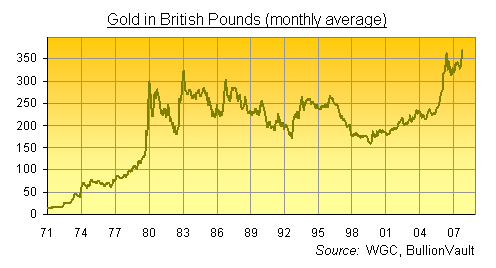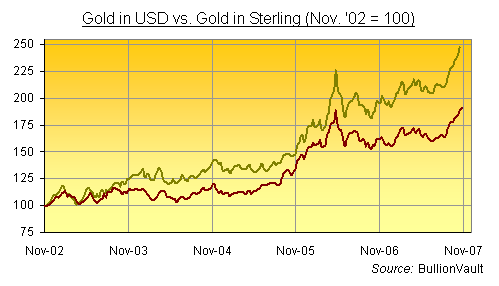Gold vs. Sterling : New All-Time High for British Investors
Commodities / Gold & Silver Oct 30, 2007 - 12:56 PM GMTBy: Adrian_Ash
 "...If you think the US Dollar's losing ground against gold, just take a look at what's happening to Sterling..."
"...If you think the US Dollar's losing ground against gold, just take a look at what's happening to Sterling..."
WHAT WILL IT TAKE for the mass of investors to wake up and buy gold?
Are they still waiting for a new all-time high perhaps, even after watching the metal beat stocks and bonds for more than six years?
Well, a new all-time high in the Gold Price just came for British investors. You might not think that's possible, what with the Pound Sterling now breaking new quarter-century highs against the Dollar above $2.06.
You might think it laughable for me to say the Pound is weak given the absurd cost of living here in London . At current exchange rates, a pack of cigarettes cost me nearly $12 this weekend.
Sure, maybe I should quit...but do I also need to stop taking the Tube (now more than $8 for a single journey), eating lunch (up to $6 for a factory-made ham and cheese sandwich) or going to the cinema (at least $20 before you buy popcorn)...?
The financial media, meantime – even when it deigns to comment on gold, formerly the axiom of Britain 's dominant position in world trade and finance at the height of its empire – remains fixated on the Dollar Price of Gold .
Why? Because Dear Old Blighty is free and clear of the problems causing the US Dollar to sink against gold, right?
But not according to gold we ain't...
"Debt-ridden Britons owe £216 billion [$445bn] on credit cards and unsecured loans but are refusing to rein in their spending," reports the Metro newspaper, given away free on the Tube today.

"Consumer debt rose by £1.35 billion [$2.78bn] last month and total debts, including mortgages, went up by £11.2 billion to £1.38 trillion [$2.84trn].
"It means the country is slipping £15 million further into the red every hour or £373 million a day."
Put another way, the British nation is growing its household debts by more than $12 per day for every man, woman and child. That's excluding the government's outstanding debt, valued above $1.18 trillion by the end of the 2006/2007 tax year.
In short, personal debt is the United Kingdom – home to the "strong Pound" – is now rising by $1 million every two minutes. Total household debt stands above 160% of personal income, and it's just overtaken an entire year of economic output.
Outstanding government debt, meantime, is equal to another 42.6% of GDP, the highest proportion in nearly a decade. It also happens to be 10 years since the British nation last managed to break-even on its international trade in goods & services.
Our balance of payments deficit reached more than £48 billion in 2006 (nearly $98bn), more than 10 times the worst gap of the mid-1970s, back when the trade gap threatened "a violent withdrawal" of foreign investment according to internal government memos.
Energy Minister Lord Balogh, an economist by trade, privately warned the Prime Minister of a "possible wholesale domestic liquidation starting with a notable bankruptcy...The magnitude of this threat is quite incalculable".
The risk of a run on the Pound in the mid-70s became so great – provoked in no small part by government debt hitting 53.8% of annual GDP – that Britain, led by a Labour government just like today, begged the International Monetary Fund (IMF) for a bail out to help it cope as unemployment and inflation reached "exceptional levels".
The Pound began its long descent from $2.42 barely $1.08 over the following decade, while unemployment rose to 10% of the working population as inflation surged above double-digits annually between 1973 and 1982.
Still, couldn't happen today!
"Expect a sustained knock-on impact of the recent credit crunch on the wider [ UK ] economy," warns David Miles, chief UK economist for Morgan Stanley in London . He's not being alarmist; he's simply summarizing the Bank of England's own view, as stated in its recent Financial Stability Report .
In particular, the Bank of England fears, the rise in the price of credit will push far beyond the spike in short-term London money-market rates. "Partly that is because risk premia and profit margins for lenders had been squeezed to unsustainable levels," explains David Miles. "Indeed, in the UK mortgage market, spreads had fallen to levels that made it hard to make money."
Now lenders are looking to make money by lending wisely – and at a profit – once again. Hence the collapse in new mortgage lending seen in Sept. Down by one-fifth from the same month last year, said the Bank of England this week, new mortgage lending in fact sank by 27% from Sept. '06 according to the British Bankers Association's latest data.
First-time buyers are "potentially vulnerable" to the threat of falling house prices sparked by this collapse in new lending. Added to higher interest rates – now at 5.75% from 4.50% two years ago – the "sharp increase in the proportion of new mortgages with high loan to income multiples since 2004 has resulted in interest payments reaching 20% of first-time buyers' average incomes," says the Bank of England, "the highest share since 1991" – the banner year for the last crash in UK house prices.
Private investors playing the property market may be even worse off, however. "Net rental yields remain negative," the Old Lady warns in her ironically titled Stability Report . "Bank staff estimate that after deducting costs, the rental yield was about 2.3 percentage points lower than the mortgage rate in third-quarter 2007.
"Recent investors are relying on continued house price appreciation to earn positive returns [but] buy-to-let investors have often invested in new-build flats in the United Kingdom , which have experienced much lower rates of price appreciation than houses."
What about the "smart money" of professional investment funds buying commercial and retail property in the UK – the next big thing according to press pundits and seasoned real estate experts alike? Oops! No again.
"Recent falls in UK commercial property prices and the more persistent falls in yields, along with the potential for overcapacity given a large pipeline of construction, make this sector particularly prone to further shocks and to rises in the cost of finance," says the Bank of England.
But surely the City of London – the powerhouse of the UK economy, now vying with New York as finance capital of the world – will forge ahead no matter what? The financial services sector has been growing at a greater than 10% annual clip, but the widely-respected Ernst & Young ITEM consultancy just halved that outlook in response to the credit crunch now forcing job cuts across the Square Mile. Researchers at CEBR, another London consultancy, believe 6,500 finance jobs will go as a direct result of this summer's credit crunch.
And gold, meantime...dumb, yellow, shiny gold...says the British Pound has never been worth less than it is today. In this race to the bottom, all prices are relative, of course.

But the Pound Sterling could soon become the Dollar's poor cousin once again, just as it was during the global stagflation of the early 1980s.
So while Gold Priced in British Pounds may have lagged the Dollar-price for the last half-decade, it's just broken a new all-time – and it looks to be pointing higher again.
By Adrian Ash
BullionVault.com
Gold price chart, no delay | Free Report: 5 Myths of the Gold Market
City correspondent for The Daily Reckoning in London and a regular contributor to MoneyWeek magazine, Adrian Ash is the editor of Gold News and head of research at www.BullionVault.com , giving you direct access to investment gold, vaulted in Zurich , on $3 spreads and 0.8% dealing fees.
(c) BullionVault 2007
Please Note: This article is to inform your thinking, not lead it. Only you can decide the best place for your money, and any decision you make will put your money at risk. Information or data included here may have already been overtaken by events – and must be verified elsewhere – should you choose to act on it.
Adrian Ash Archive |
© 2005-2022 http://www.MarketOracle.co.uk - The Market Oracle is a FREE Daily Financial Markets Analysis & Forecasting online publication.



